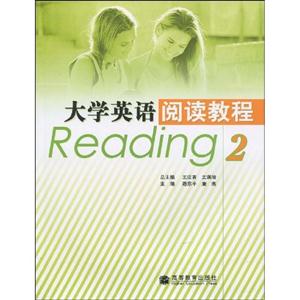-
>
闖進(jìn)數(shù)學(xué)世界――探秘歷史名題
-
>
中醫(yī)基礎(chǔ)理論
-
>
當(dāng)代中國(guó)政府與政治(新編21世紀(jì)公共管理系列教材)
-
>
高校軍事課教程
-
>
思想道德與法治(2021年版)
-
>
毛澤東思想和中國(guó)特色社會(huì)主義理論體系概論(2021年版)
-
>
中醫(yī)內(nèi)科學(xué)·全國(guó)中醫(yī)藥行業(yè)高等教育“十四五”規(guī)劃教材
大學(xué)英語閱讀教程-2 版權(quán)信息
- ISBN:9787040282115
- 條形碼:9787040282115 ; 978-7-04-028211-5
- 裝幀:一般膠版紙
- 冊(cè)數(shù):暫無
- 重量:暫無
- 所屬分類:>>
大學(xué)英語閱讀教程-2 本書特色
本書編寫?yīng)毺兀滩脑O(shè)計(jì)針對(duì)閱讀過程,本書注意培養(yǎng)學(xué)生的閱讀技巧和能力,專注于在閱讀過程中激發(fā)學(xué)生的動(dòng)機(jī),培養(yǎng)興趣;教材強(qiáng)調(diào)快樂閱讀的理念,因此,從文章的篇章安排,文章長(zhǎng)短度,教學(xué)建議等各方面都作了較好處理;階梯式訓(xùn)練閱讀技巧,本書的閱讀技巧部分由6個(gè)單元組成,分別介紹了6種閱讀技巧,通過大量的由易到難的階梯式操練,幫助學(xué)生理解并掌握所涉及的具體閱讀技巧;培養(yǎng)學(xué)生的思維能力,本書通過系列練習(xí),培養(yǎng)學(xué)生理解英語句子的能力,幫助學(xué)生了解英語思維的邏輯性、連貫性和一致性;本教材還重視學(xué)生間的互動(dòng),通過一對(duì)一活動(dòng)或小組討論,進(jìn)一步加強(qiáng)學(xué)生對(duì)生閱讀和思維過程的認(rèn)識(shí)。
大學(xué)英語閱讀教程-2 內(nèi)容簡(jiǎn)介
《大學(xué)英語閱讀教程2》編寫?yīng)毺兀饕攸c(diǎn)為: 1.教材設(shè)計(jì)針對(duì)閱讀過程。《大學(xué)英語閱讀教程2》注意培養(yǎng)學(xué)生的閱讀技巧和能力,專注于在閱讀過程中激發(fā)學(xué)生的動(dòng)機(jī),培養(yǎng)興趣; 2.教材強(qiáng)調(diào)快樂閱讀的理念。因此,從文章的篇章安排,文章長(zhǎng)短度,教學(xué)建議等各方面都作了較好處理; 3.階梯式訓(xùn)練閱讀技巧。《大學(xué)英語閱讀教程2》的閱讀技巧部分由6個(gè)單元組成,分別介紹了6種閱讀技巧,通過大量的由易到難的階梯式操練,幫助學(xué)生理解并掌握所涉及的具體閱讀技巧; 4.培養(yǎng)學(xué)生的思維能力。閱讀過程即是思考過程,為了提高理解能力,學(xué)生要逐步學(xué)會(huì)用英語思考,《大學(xué)英語閱讀教程2》通過系列練習(xí),培養(yǎng)學(xué)生理解英語句子的能力,幫助學(xué)生了解英語思維的邏輯性、連貫性和一致性; 5.本教材還重視學(xué)生間的互動(dòng),通過一對(duì)一活動(dòng)或小組討論,進(jìn)一步加強(qiáng)學(xué)生對(duì)生閱讀和思維過程的認(rèn)識(shí)。在互動(dòng)交流中,學(xué)生能更加準(zhǔn)確地形成和表達(dá)思想并且獲得對(duì)一篇課文進(jìn)行討論和思考的新方法。同時(shí),鼓勵(lì)學(xué)生寫作,分享彼此的讀寫成果,認(rèn)識(shí)閱讀與寫作之間的密切關(guān)系。
大學(xué)英語閱讀教程-2 目錄
大學(xué)英語閱讀教程-2 節(jié)選
《大學(xué)英語閱讀教程2》編寫?yīng)毺兀饕攸c(diǎn)為:1.教材設(shè)計(jì)針對(duì)閱讀過程。《大學(xué)英語閱讀教程2》注意培養(yǎng)學(xué)生的閱讀技巧和能力,專注于在閱讀過程中激發(fā)學(xué)生的動(dòng)機(jī),培養(yǎng)興趣;2.教材強(qiáng)調(diào)快樂閱讀的理念。因此,從文章的篇章安排,文章長(zhǎng)短度,教學(xué)建議等各方面都作了較好處理;3.階梯式訓(xùn)練閱讀技巧。《大學(xué)英語閱讀教程2》的閱讀技巧部分由6個(gè)單元組成,分別介紹了6種閱讀技巧,通過大量的由易到難的階梯式操練,幫助學(xué)生理解并掌握所涉及的具體閱讀技巧;4.培養(yǎng)學(xué)生的思維能力。閱讀過程即是思考過程,為了提高理解能力,學(xué)生要逐步學(xué)會(huì)用英語思考,《大學(xué)英語閱讀教程2》通過系列練習(xí),培養(yǎng)學(xué)生理解英語句子的能力,幫助學(xué)生了解英語思維的邏輯性、連貫性和一致性;5.本教材還重視學(xué)生間的互動(dòng),通過一對(duì)一活動(dòng)或小組討論,進(jìn)一步加強(qiáng)學(xué)生對(duì)生閱讀和思維過程的認(rèn)識(shí)。在互動(dòng)交流中,學(xué)生能更加準(zhǔn)確地形成和表達(dá)思想并且獲得對(duì)一篇課文進(jìn)行討論和思考的新方法。同時(shí),鼓勵(lì)學(xué)生寫作,分享彼此的讀寫成果,認(rèn)識(shí)閱讀與寫作之間的密切關(guān)系。
大學(xué)英語閱讀教程-2 相關(guān)資料
插圖:In a short time, the sun was hidden by the ash and smoke from themountain. It was as dark as night in Pompeii. Ash and rocks began to fall fromthe sky. Some of the rocks were very small, but some were the size of tennisballs. People ran screaming through the streets. In the marketplace, bakersforgot about their bread. Farmers forgot about their vegetables. Even thegladiators in the stadium dropped their weapons and ran. Everyone was terrified. Rich people ran to get their jewelry and gold.Religious people called to the gods for help. As the people ran, hot ash fell onthem. It stuck in people's throats and got in their eyes. Their clothes were sooncovered with ash. The rocks fell on their heads. Some people tied cushions totheir heads to protect themselves. The air became so thick with ash and smoke that people couldn't breathe.The ash soon filled the streets and piled up on roofs. The weight of the ashand rocks caused houses to fall in. The town was quickly disappearing under ablanket of gray ash. Some people ran to the seaside and tried to get into boats.The sea was wild. Huge waves crashed onto the beach. Still, some familieswere able to escape that way. Other people ran into the countryside, awayfrom the mountain.In the end, most of the people about 20,000 got away from Pompeiiin time. But about 2,000 people didn't get away. They were buried under theashes. In less than two days, the whole ci~ was buried under about 15-25 feet(4.5-6 meters) of ashes. Then it rained, and the ashes became hard as rock.Across the bay from Pompeii was another small city. The people who livedthere saw everything. They saw the mountain explode and a black cloud coverPompeii. They saw people trying to escape by water or by land. They talkedto the people who arrived by boat. A boy named Pliny was there. He watchedand listened to everything. When he grew
- >
我與地壇
- >
月亮虎
- >
巴金-再思錄
- >
名家?guī)阕x魯迅:朝花夕拾
- >
李白與唐代文化
- >
羅庸西南聯(lián)大授課錄
- >
羅曼·羅蘭讀書隨筆-精裝
- >
莉莉和章魚

















